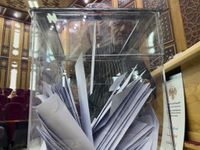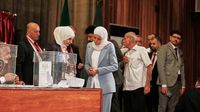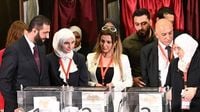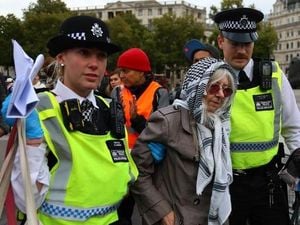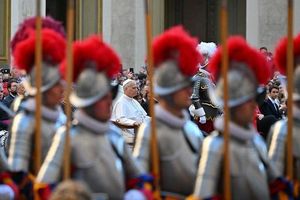Ballot boxes closed across Syria on October 5, 2025, as the country held its first parliamentary elections since the dramatic ouster of Bashar al-Assad nearly a year ago. The event, widely described as historic by interim authorities and observers alike, marked a tentative but significant step in Syria’s long and tumultuous political transition after almost 14 years of devastating civil war.
Under tight security, members of electoral colleges gathered at polling stations from Damascus to Aleppo, tasked with choosing 140 of the 210 seats in the new People’s Assembly. The remaining 70 seats would be filled through direct appointment by interim President Ahmed al-Sharaa, a move designed, according to officials, to ensure representation of women and minorities in a country still deeply scarred by sectarian violence and displacement.
For many Syrians, the day was a mixture of hope, skepticism, and cautious optimism. “This is the first time I’ve ever voted in my life. I’m happy, and I don’t mind standing in line for a long time,” said Lina Daaboul, a doctor in Damascus who was initially reluctant to participate but ultimately viewed it as a national duty, according to the Associated Press. Daaboul’s thorough approach—studying candidate profiles and consulting with friends—reflected the seriousness with which some Syrians approached this unfamiliar exercise.
Yet, for all the anticipation, the process was far from a conventional democratic election. There was no direct popular vote; instead, a province-based electoral college system was used. Out of more than 7,000 eligible electoral college members across 60 districts, only those selected could vote for the 140 elected seats, while the rest of the assembly would be appointed by al-Sharaa. As Al Jazeera reported, the hybrid system has drawn sharp criticism from civil society groups and opposition figures, who argue it consolidates power among the new ruling elite and falls short of genuine democracy.
“You can call the process what you like, but not elections,” said Bassam Alahmad, executive director of Syrians for Truth and Justice, in a statement to AFP. A coalition of more than a dozen non-governmental organizations warned that the system allows al-Sharaa to “effectively shape a parliamentary majority composed of individuals he selected or ensured loyalty from,” potentially undermining the pluralism needed for real democratic change.
The election was further complicated by the ongoing instability in several regions. Voting was indefinitely postponed in the Druze-majority province of Suwayda and in the Kurdish-controlled northeastern provinces of Hasakah and Raqqa due to tensions between local authorities and the central government. These areas, which remain outside Damascus’s control, will see their parliamentary seats remain vacant until conditions improve, raising concerns about the representativeness of the new assembly.
Despite these challenges, interim President al-Sharaa hailed the election as a landmark. Speaking after observing the voting process at the National Library Center in Damascus, he declared, “This historic moment among Syrians is very important. There are many pending laws that need to be voted on to advance the process of construction and prosperity.” He went on to emphasize the collective mission of rebuilding Syria, stating, “Building Syria is a collective mission, and all Syrians must contribute to it.”
The new parliament will serve a 30-month term, during which it is expected to pass a new elections law and draft a constitution that could pave the way for future popular votes. As CNN reported, the campaign period leading up to the election was brief but active, with 1,578 candidates approved to run, including just 14 percent women. The absence of political parties—dissolved by the new authorities after Assad’s ouster—meant that all candidates ran as independents, an unusual situation for a country accustomed to the Baath Party’s dominance.
Initial results highlighted some of the system’s shortcomings. Early counts from Idlib, Deir Ezzor, and the Damascus countryside showed no female candidates winning seats, prompting officials to invoke a 20 percent quota for women to be filled through presidential appointments. Mohammad Taha al-Ahmad, head of the Higher Election Committee, told DPA that al-Sharaa would review the final results to ensure that women and minorities are fairly represented, with women expected to make up at least one-fifth of deputies.
In Latakia, a coastal city and former Assad stronghold, three Sunni candidates won seats amid lingering sectarian tensions. The province had recently witnessed revenge attacks that killed hundreds of Alawite civilians, underscoring the deep divisions that still haunt Syria. Rola Daya, one of the newly elected legislators from Latakia, acknowledged the difficulties ahead: “Of course, internal tensions remain—it will take time to resolve. Transitional justice is needed so we can move toward civil peace.”
Observers noted the absence of political campaigns and parties, but some voters and candidates found new freedoms in the process. Rim Yajizi, a lawyer and candidate in Damascus, remarked, “It’s enough to mention the freedom factor, the electoral statements and the debates we watched and participated in. We had never seen anything like it before.” Ibrahim Halabi, a former soldier from Aleppo who defected in 2012, told AP, “This is the first time in our lives we’ve participated in a democratic electoral process without outside pressure.”
Still, the question of whether Syria’s new parliament can truly represent its fractured and diverse population remains open. The exclusion of Kurdish-held and Druze-majority regions, combined with the lack of quotas for religious or ethnic minorities, has raised concerns among analysts and ordinary citizens alike. “Syria needs everything,” Al Jazeera’s Osama Bin Javaid observed, pointing to the daunting tasks facing the new assembly: rebuilding the economy, establishing security, and forging a sense of national unity.
Even as critics decry the process as undemocratic and potentially manipulated, others see it as a necessary—if imperfect—step toward recovery. As interim President al-Sharaa put it, “This moment is crucial for all Syrians. It is time to rebuild our nation together.” The coming months will reveal whether this first cautious experiment in parliamentary politics can lay the groundwork for a more inclusive and stable Syria.
